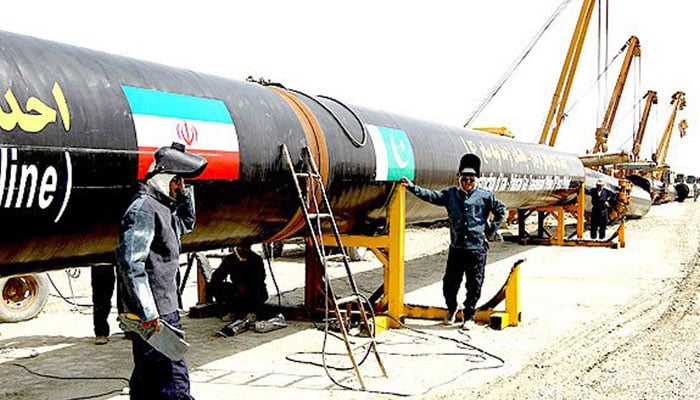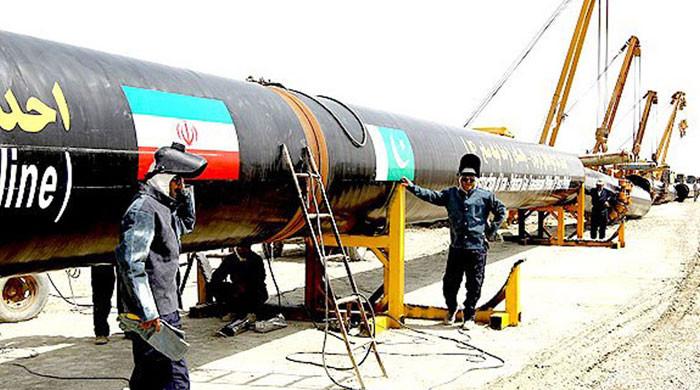
- Project cannot continue due to US sanctions: Government official.
- The French Court of Arbitration has rejected Washington’s sanctions.
- According to the contract, Pakistan is obligated to construct the pipeline by 2024.
ISLAMABAD: Pakistan has filed three lawsuits at the Paris Arbitration Court after being moved by Iran over Islamabad’s failure to complete parts of a bilateral gas pipeline and take in 750 mmcfd of gas. Hired the services of a law firm. news It was reported on Wednesday.
Sources in the Department of Justice and the Attorney General’s Office say the federal government is seeking the services of reputable international law firms such as White & Case, Three Crowns and Willkie Farr Gallagher, as well as key lawyers domiciled in Australia. He said he had obtained the services of one person. He is well known around the world as one of the leading lawyers in the oil and gas infrastructure field.
“We submitted details on October 18, 2024 to the France-based Secretariat of the Arbitration Tribunal regarding the legal team representing Pakistan in the Arbitration Tribunal proceedings,” the official said.
Meanwhile, relevant authorities briefed a law firm and one key lawyer on the Iran-Pakistan (IP) gas pipeline project and why Pakistan was unable to realize the cross-border project.
“Pakistan will now appoint one arbitrator based on the opinions of its lawyers. Similarly, one arbitrator will be appointed by Iran, after which both countries will jointly appoint a third arbitrator. .This completes the proceedings before the arbitral tribunal.”Added source for this matter.
Once completed by the arbitral tribunal, the case is likely to be decided within a year. In early August 2024, Iran served an ultimatum on Pakistan, accusing the Iranian government of failing to construct a pipeline based on the IP gas project within the extended 180-day deadline. In September 2018, the court notified that it had no choice but to file a lawsuit with the Paris Court of Arbitration.
The project has faced a 10-year delay since 2014 due to proposed US sanctions against the project. The GSPA (Gas Sale and Purchase Agreement) was signed in 2009 under French law. An arbitration tribunal is a forum for adjudicating disputes between two countries.
The French Court of Arbitration has rejected the US sanctions.
Pakistan Interstate Gas System (ISGS) and National Iranian Gas Company (NIGC) signed a revised agreement in September 2019. Under the agreement, Iran will not resort to any international tribunal for delays in the pipeline’s construction.
But Pakistan will build the pipeline by 2024, after which it will take in 750 million cubic feet of gas daily from Iran.
Under the amended contract, Pakistan was obligated to construct part of the pipeline within its territory from February to March 2024. Iran has encouraged Pakistan to extend the 180-day deadline, which is set to expire in September 2024. However, the authorities again failed to lay it. pipeline. Iran then issued an ultimatum.
According to French law, if Iran does not exercise its right to move the arbitral tribunal by September 2024, it will lose the right to launch a legal battle against Pakistan. Earlier, Iran issued a second legal notice to Pakistan in November-December 2022, ordering Islamabad to construct part of a gas pipeline in its territory by February-March 2024. They asked them to do so, or be prepared to pay billions of dollars in penalties.
In February 2019, the Iranian government notified Islamabad of its intention to move to an arbitration court and threatened to invoke the penalty provisions of the GSPA. The GSPA was signed in 2009 for a period of 25 years.
“Due to U.S. sanctions, we simply cannot move forward with this project,” the official said. news.
“Although we worked hard with the Americans to seek a U.S. exemption, the Biden administration opposes the plan, and a U.S. Congressional committee reported in March 2024 that Donald Lew, Assistant Secretary of State, ‘We have been warned that there will be serious consequences if the US side goes down.”’ The official added: “We are cooperating with Iran on the IP gas line project.”
Under the original agreement, Pakistan was obligated to pay Iran $1 million per day starting January 1, 2015, under a penalty clause.
The project was to be implemented under a partition approach, meaning Iran would build the pipeline on its side and Pakistan would build it within its territory.
It was scheduled to be completed by December 2014 and operational from January 1, 2015.
“Pakistani authorities had planned to partially implement the IP gas pipeline project by laying an 81-kilometre pipeline from Gwadar to the Iranian border to show their seriousness about the project. could not be carried out,” the official said.

